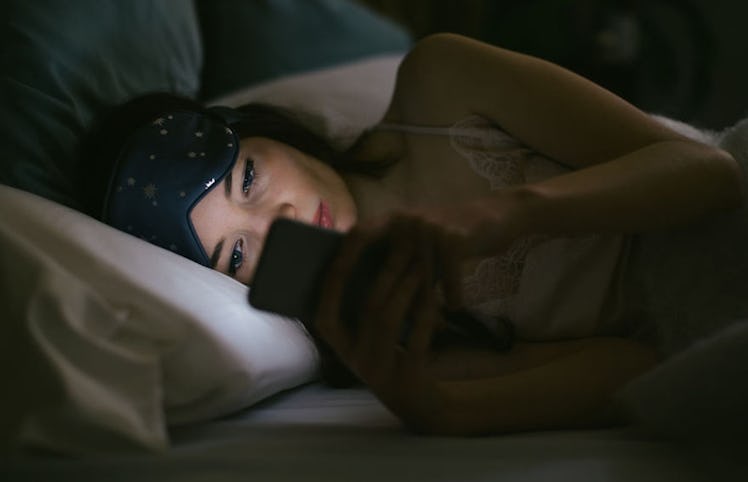
A New Study Revealed A Scary Reason For Why You Shouldn’t Look At Your Phone In Bed
I know I should probably end my days with a mind-enriching book, but I must confess: I love falling asleep to the sweet glow of social media apps on my phone. However, those late-night hours spent in bed stalking your crush's IG could be hurting your eyes, and I don't just mean in a, "Wow, those photos are painfully beautiful" way. It might finally be time to either unfollow Michael B. Jordan or keep your Insta-stalking to daylight hours if you want to keep your eyes healthy, because a new study says blue light is definitely bad for your eyes, particularly in the long-term.
The study, carried out in a lab setting by researchers from the University of Toledo and published in the journal Scientific Reports, found that blue light, like the kind emitted from your phone or laptop, can kill certain cells in your eyes, which is dangerous in and of itself. If that wasn't enough, the research also found that blue light can potentially lead to blindness later in life.
Kasun Ratnayake, a Ph.D. student researcher who worked on the study, explained in a University of Toledo press release that when you expose your vision to blue light, it essentially destroys photoreceptors in your eyes, which are the cells that help you process and make sense of light, colors, etc. And the bad news is that once those cells are gone, you're out of luck: “Photoreceptor cells do not regenerate in the eye. When they’re dead, they’re dead for good,” Ratnayake explained. And when blue light begins to eliminate your photoreceptors, it speeds up the development of something called macular degeneration, which is "the leading cause of vision loss," according to the American Macular Degeneration Foundation.
While this is obviously pretty scary news, thankfully there are some things you can do to reduce the effects of blue light on your vision.
Step One: Adjust The Colors Of Your Phone Screen
If you're simply too obsessed with the Kardashians to ever miss the latest twist in Kourtney K and Younes Bendjima's reported relationship drama, even when the updates come in when you've already crawled into bed for the night, there is one easy fix you can make to ensure your phone is a little less harmful to your eyes.
If you have an iPhone, in the settings app on your device, make sure the "night shift" feature is turned on. You can set it to begin automatically at the time of day of your choosing, or you can just turn it on manually whenever you want to use it. Basically, this snazzy iPhone feature adjusts your screen colors and brightness to the warm end of the color spectrum, which reduces the use of blue light and thus protects those all-too-important photoreceptors.
Step Two: Invest In Blue Light-Blocking Glasses
While there doesn't appear to be any scientific evidence to support the effectiveness of blue light glasses in terms of protecting your eyes from long-term damage, a quick internet search of these products pulls up tons of favorable reviews, with several people saying these types of glasses, at the very least, minimize some of the physical strain they feel in their eyes when looking at screens all day.
TBH, it can be sort of difficult to come by blue light-blocking glasses that don't make you look like you're about to conduct a gnarly experiment in chem class, but the above pair from Pixel Eyewear aren't half bad, if you ask me. And, if you're simply planning on using these bad boys in the privacy of your own home, or you just plain DGAF about looking a little goofy in public, New York Magazine recommends Uvex Skyper Blue Light Blocking Computer Glasses, which are only about $8 a pop on Amazon — but yes, they do look a little, well, unique. “It’s shown when you use these [types of glasses], the light doesn’t suppress your melatonin, and it prevents a phase-shift and it can improve sleep," Cathy Goldstein, an assistant professor of neurology at the University of Michigan Sleep Disorders Center, told NYMag.
Step Three: Give Your Bedside Lamp An Eye-Friendly Makeover
If you're looking to dial down on your blue light exposure, Harvard Health Letter recommends using a dim red lightbulb in the bedroom. Besides creating a warm atmosphere to help soothe you to sleep, the colored light "has the least power to shift circadian rhythm and suppress melatonin," according to the newsletter.
Remember: The more eye-protecting measures you take, the more hours you can spend retweeting Chrissy Teigen's latest joke on Twitter.
This article was originally published on